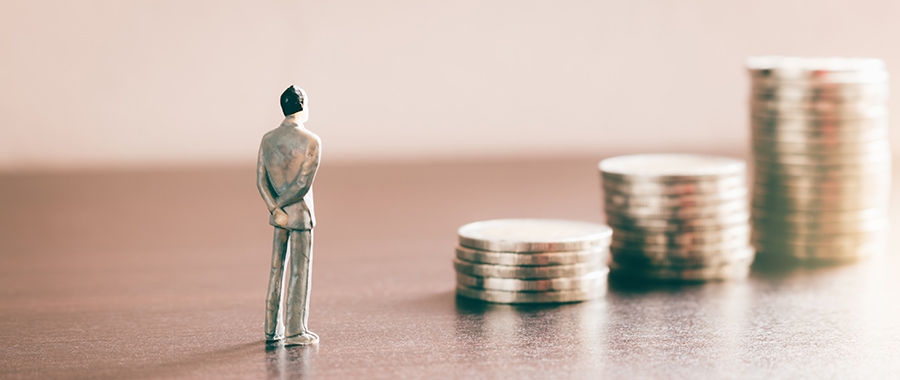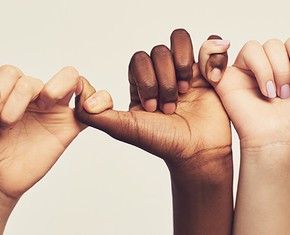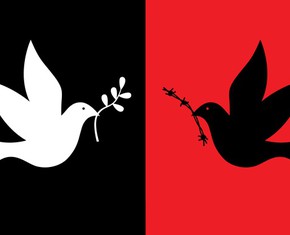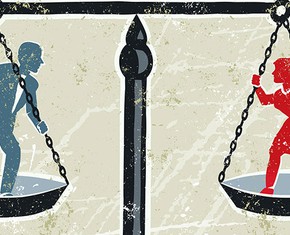The views expressed in our content reflect individual perspectives and do not represent the authoritative views of the Baha'i Faith.
It’s not easy being a modern person in today’s world, keeping up with ever-changing demands for the newest in consumables.
In some ways it was easier when I was a child; there was less choice. Back then, shop-bought clothing for children was the exception rather than the rule. At school my brothers learned woodwork and metalwork while I learned sewing, cooking and budgeting, and would soon inherit my mother’s and grandmother’s prized books on domestic skills. Even two decades later we average mothers were expected to make much of our own family’s clothing and most everything else as well, to know how to patch, darn, lengthen, shorten, and whatever might be required to make an item of apparel last one more season. We needed to know how to preserve food in season for a later date, and cook recipes using only those ingredients that were available at the time.
When I was a child of an average income family, we had ‘winter’ clothes and ‘summer’ clothes, and would ring in the changes by increasing or decreasing layers of undergarments or outer ones as the weather required. Our wardrobes consisted of a few ordinary outfits for school, some hand-me-downs for play, and one good church outfit for Sundays. Today many Westerners expect an entirely new wardrobe for every changing season; clothing often made at ridiculously cheap prices by sweatshop labor in foreign countries using practices that embody inequity, discrimination, and exploitation. Local authorities puzzle over how best to dispose of our growing mountains of garbage, and whole television programs devote themselves to watching hoarders struggle to physically move within the narrow confines of homes strangled by useless possessions.
The challenge to current economic theories requires that we stop seeing the individual as merely a self-interested economic unit, striving to claim an ever-greater share of the world’s material resources. The Baha’i teachings tell us that we are not what we possess—and that we are more than what society may perceive us to be:
O peoples of the world! Forsake all evil, hold fast that which is good. Strive to be shining examples unto all mankind, and true reminders of the virtues of God amidst men … Man’s merit lieth in service and virtue and not in the pageantry of wealth and riches. Take heed that your words be purged from idle fancies and worldly desires and your deeds be cleansed from craftiness and suspicion. Dissipate not the wealth of your precious lives in the pursuit of evil and corrupt affection, nor let your endeavours be spent in promoting your personal interest. – Baha’u’llah, Tablets of Baha’u’llah, p. 138.
To view the worth of an individual chiefly in terms of how much one can accumulate and how many goods one can consume, relative to others, is wholly alien to Baha’i thought. But neither do the Baha’i teachings dismiss wealth as inherently distasteful or immoral, or uphold the practice of ascetic self-denial.
The vision of Baha’u’llah challenges many of the assumptions that shape our contemporary discourse—for instance, that self-interest, far from needing to be restrained, actually drives prosperity; the ‘trickle-down’ theory that wealth at the top must inevitably become enjoyed by the workers at the bottom, and that progress depends upon relentless competition, as evidenced by reality game shows that reward individual financial attainment at the expense of others.
The Baha’i teachings say that wealth must serve all humanity, not just the few at the top of the economic heap. It must be expressed in systems based on spiritual principles of equity, wisdom and justice:
No light can compare with the light of justice. The establishment of order in the world and the tranquillity of the nations depend upon it. – Baha’u’llah, Epistle to the Son of the Wolf, pp. 28-29.
Baha’u’llah’s teachings do not provide every detail of a specific economic system, but they do call for a progressive reorganization of human society, ultimately far beyond anything we’ve yet imagined.
That reorganization begins when we reflect on how to optimally participate in essentially material matters in ways that best embody spiritual principles.
Such an advancement calls for practical applications of justice and generosity, collaboration and mutual assistance; for a new model of economic and community life that is patterned on the love and compassion expressed in the Baha’i teachings. It requires change on the part of the individuals who comprise our communities, to demonstrate in our own lives a rectitude of conduct that embodies principles like equity, honesty, and accountability in every choice we make, whether as employee or employer, producer or consumer, borrower or lender, benefactor or beneficiary.
We all have a moral duty to lead lives in which the most down-to-earth economic decisions are based on lofty ideals, and the purity of our aims is matched by the purity of our actions in fulfilling those aims. The Baha’i teachings set a lofty standard we can all aspire to in our social and economic engagements.
We need to increasingly look to these spiritual principles to guide and inspire the economic relationships within our families and neighborhoods. Not content with the materialistic values of the prevailing order, we should consider how best to apply these teachings to our private and public lives and, using whatever opportunities our personal circumstances allow, to make our own individual and collective contributions to economic justice and social progress wherever we live.
Unlike the values expressed in our current extremely avaricious game shows and lotteries, humankind’s economic life should become an arena for the expression of honesty, integrity, trustworthiness, generosity, and other qualities of the spirit.
Baha’is believe that by turning our attention to the service of others, we can find meaning and purpose in life and contribute to the upliftment of society itself:
Is any larger bounty conceivable than this, that an individual, looking within himself, should find that by the confirming grace of God he has become the cause of peace and well-being, of happiness and advantage to his fellow men? No, by the one true God, there is no greater bliss, no more complete delight. – Abdu’l-Baha, The Secret of Divine Civilization, pp. 2-3.
The Baha’i teachings ask those who are possessed of riches to “have the utmost regard for the poor.” Abdu’l-Baha affirms that wealth is:
… praiseworthy in the highest degree, if it is acquired by an individual’s own efforts and the grace of God, in commerce, agriculture, art and industry, and if it be expended for philanthropic purposes. – Ibid., p. 24.
At the same time, the Baha’i writings warn us about wealth’s perilous allure, that it can be a “mighty barrier” between the believer and God. No wonder, then, that Baha’u’llah praised wealthy people who remain spiritually unhindered by their riches; saying their souls “shall illuminate the dwellers of heaven even as the sun enlightens the people of the earth!” – Baha’u’llah, The Hidden Words, p. 41.
Abdu’l-Baha said that:
… if a judicious and resourceful individual should initiate measures which would universally enrich the masses of the people, there could be no undertaking greater than this, and it would rank in the sight of God as the supreme achievement. – Ibid.
So Baha’is understand that wealth becomes most commendable “provided the entire population is wealthy.” – Ibid.
Examining our lives to determine the necessities, and then reflecting on the needs of family and society, is essential to bring our personal priorities into balance and ensure that we contribute our fair share to the greater good. Contentment and moderation, benevolence, kinship, sacrifice and reliance on the Almighty at all times are qualities that will increasingly come to befit our souls.
















Comments
Sign in or create an account
Continue with Googleor